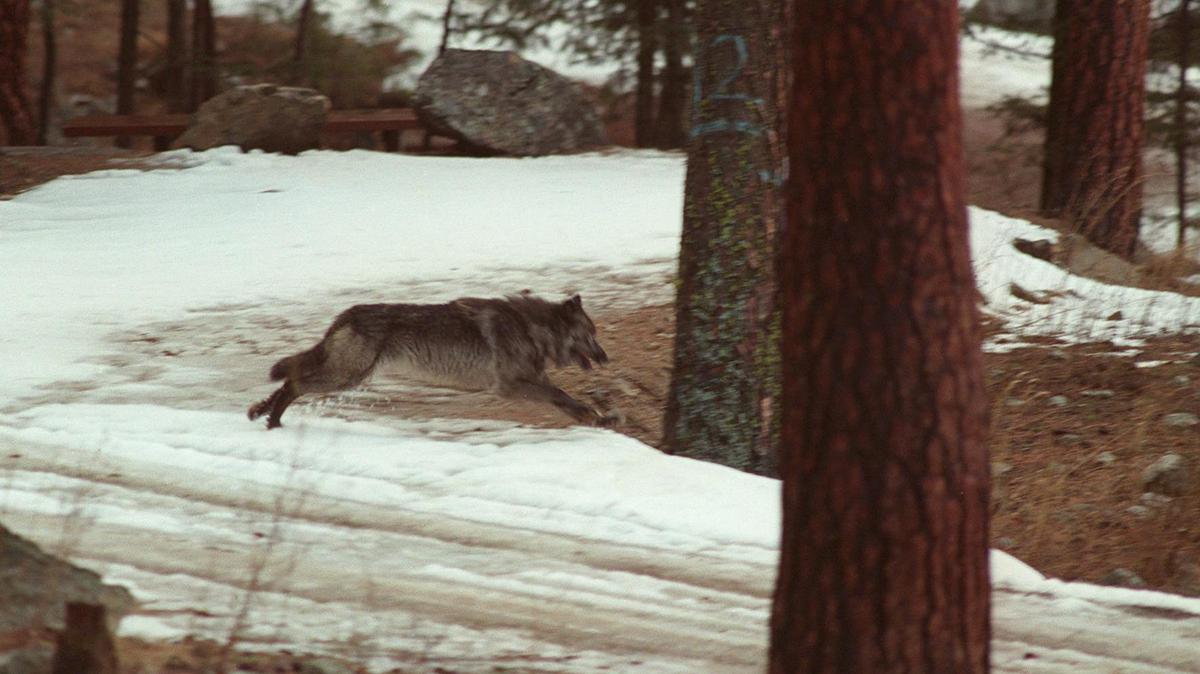
A Death Of Ethics: Is Hunting Destroying Itself?
FROM KILLING ENTIRE WOLF OR BABOON FAMILIES TO STAGING PREDATOR-KILLING CONTESTS, HUNTERS STAND ACCUSED OF VIOLATING THE NORTH AMERICAN MODEL OF WILDLIFE CONSERVATION.
NOW THEY’RE BEING CALLED OUT BY THEIR OWN
Right now, as you read these words, it is perfectly legal in the state of Wyoming for a person to climb on the back of a snowmobile and chase down wild wolves, pursuing them until they drop from physical exhaustion. And, if that’s not enough, you can then run them over relentlessly with the machine, injuring them until they die.
You don’t need a hunting license, nor even a bullet to kill a wolf. You can do the above with impunity across roughly 85 percent of Wyoming which, as the “Cowboy State” encompasses almost 98,000 square miles, including vast sweeps of public land.
You don’t need a reason to justify your actions either. Even if game wardens were to bear witness, it is highly unlikely you would catch any flak—unless your conduct happened to startle a deer, elk, pronghorn or domestic cow or horse, and then you might earn a scolding for harassing wildlife or livestock.
In fact, wolves, which were recently taken off the list of federally-protected species and their management handed over to the state unconditionally in 2017, can be killed by virtually any means, any time of day, any day of the year, without limit in most of Wyoming.
Never in the proud modern history of American wildlife conservation has an iconic animal commanding such mystique as a wolf been the subject of overt government policies encouraging its
re-eradication after millions of public dollars were invested in species recovery.
It isn’t even that, as charismatic social animals, wolves in Wyoming are treated as worthless. Their status, by intent, is actually lesser than that because they are relegated pejoratively to “predator” classification—another word for vermin—reserved for feral cats, skunks, and exotic rats.
Lawmakers in Cheyenne, the capital, have long resented wolves being brought back to their state. They regard the native canids as unwanted liabilities imposed upon them, though the presence of wolves in Wyoming’s top two tourist destinations, Yellowstone and Grand Teton national parks, helps generate tens of millions of dollars annually for local economies because they attract legions of avid wolf watchers.
Echoing a mentality that first rose on the 19th-century frontier and still continues, Wyoming’s attitude toward wolves is driven by deep-seated antagonism and defiance. Accused of “devastating” big game herds and wreaking widespread havoc on the livestock industry in spite of scant evidence to support these claims, lobos in the vast majority of Wyoming (except for just 15 percent of the state that includes Yellowstone and Grand Teton) share despised company with another canid unique to North America, the coyote.
Snowmobiles aren’t the only non-firearms tools hunters can employ to destroy these carnivores; lobos, coyotes and their young offspring can be felled with poison, flattened by ATVs, snared, and incinerated live by pouring gas or dynamite into their dens and then lightning a match—acts that most would consider barbaric. If a person doesn’t want to do the killing himself, he can summon gunners employed by a federal agency called Wildlife Services, a division within the U.S. Department of Agriculture, to shoot wolves and coyotes from the sky using aircraft.
One former state wildlife professional in Wyoming told Mountain Journal that “what happens with wolves is kind of our dirty little secret—and if the public only knew this is allowed, people would be outraged, deservedly so.”
Today, critics partially blame the U.S. Fish and Wildlife Service—ironically the very federal steward in charge of nurturing imperiled species toward recovery—for allowing it to happen. Former national director of the Fish and Wildlife Service Dan Ashe told Mountain Journal last summer the agency must abide by states’ rights and the way the Endangered Species Act is currently written, respecting the wishes of whatever states decide to do after an animal is returned to their custody. (The same rationale would apply to the hand over of Greater Yellowstone grizzly bears from federal to state jurisdiction).
In autumn 2018, Chief U.S. District Judge Dana L. Christensen in Missoula, Montana, citing deficiencies in the government’s bear recovery strategy, ordered that grizzlies be returned to federal protection under the Endangered Species Act. Still, in light of what’s happening with wolves, there’s little wonder, observers say, why conservationists have dubious trust that state management in Wyoming will work out well for bruins.
The Fish and Wildlife Service initially told Wyoming it would demand that wolves be classified as a game animal across the entire state, thereby ensuring they be managed professionally, like other major species, with hunting quotas and seasons, the same as they are in Montana and Idaho. The Wyoming legislature and governor, however, defied the demand and the Fish and Wildlife Service capitulated.
A former senior official with the Fish and Wildlife Service, who does not want his name used because he is a friend of Ashe, said, “The Service knew Wyoming would allow the same disgraceful things that happen with coyotes to also happen to wolves, which it knew was wrong and inconsistent with the intent of recovering a species, and yet the Service let it happen anyway because of political pressure.”
According to Wyoming statute, wolves in 4/5ths of the state can be killed “with, from,
or by use of any aircraft, automotive vehicle, trailer,
35 motor-propelled wheeled vehicle or vehicle designed for travel over snow.” Predators are exceptions to protection under animal cruelty and wildlife harassment codes.
How do we know some hunters make sport out of running down wild canids with snowmobiles? Besides
boastful evidentiary comments, chatter that happens often in saloons, and occasional photographs surfacing, it’s more common than one thinks in western states—and it’s
documented on social media here (
WARNING: the footage is disturbing) and below.
Not long ago, amateur footage documented a bearded hunter, appearing like a character lifted out of Mad Max, roaring on his snowmobile, purportedly across Wyoming’s open, frozen, snow-covered hinters, chasing down coyotes. The video was sound-tracked with a Country-Western tune.
Viewers see the driver throttling toward a coyote then run it over, allowing the traumatized animal to get up and try to flee so he can chase it again. Note: the rider denies that he ever shot the coyote and we don’t know what happened to it after it was run down.
Still the footage yielded praise from several viewers declaring how fun it is to slay ‘yotes. One commentator, however, representing the disgust of others, wrote: “I’m a hunter and a trapper
n [sic] don’t agree with running them over with your sled. That’s not a humane dispatch. It’s clear you didn’t grow up with a Dad teaching you about hunter ethics. Sorry man.”
Notably—and this is important—the film mentioned above, titled on Youtube “Running coyotes@wyohoundsmen,” wasn’t the product of a covert investigation conducted by an animal rights organization; it was carefully produced by a “hunter,” freely shared and promoted ostensibly to attract personal attention—and glory.
For perspective, were a citizen to treat a domestic dog, cat, horse, cow, lamb, wild deer, elk, or pronghorn this way the individual would likely face animal cruelty charges or be arrested on violations of game laws, bringing fines and potential jail time. (Read the Wyoming statutes
here.) He would also earn shame in his community.
Yet in Wyoming and other states in the American West, persecution of coyotes isn’t encumbered by any animal welfare statutes but venerated as a cultural tradition.
If you can, take a look at the photo and video, above. They offer brutal glimpses at reality, and they speak not only truth on the ground but to the fact such behavior is condoned by political and social leaders in Wyoming, who let them happen without comment.
Longtime Wyoming wildlife conservationist Lisa Robertson shared the images on Facebook along with this short narrative: “Would anyone like to know the story behind this photo? Do you have any idea what it could be? Believe me, you could never imagine what I am going to share with you. If you can’t stomach reality, please read no further.
“This…coyote is one of thousands that are being persecuted by killers in our state who practice the sport of Yote Whackin’. It includes coyote killing contests and snowmobiles. This coyote is plastered in the snow under a snowmobile after just being chased until it could no longer escape. The snowmobiler arranged his camera on the ‘bile to film himself as he grabbed the coyote by the tail and swung the coyote to beat its head against the ‘bile, again and again, until the job is done when he tosses the coyote on the back of the ‘bile, as he smiles into the camera.”
When it comes to ethics in hunting and the principle of “fair chase,” is there a common playbook that prescribes how humans ought to conduct themselves when stalking wild animals for food, trophy and thrill?
Consider the circumstances of still another incident involving a sportsman from the northern Rockies whose controversial conduct made headlines around the world: The case involves a (now former) Idaho Fish and Game commissioner named Blake Fischer.
Mr. Fischer headed off to Africa with his wife on a sport hunting safari, killed an entire family of baboons with bow and arrows and then posed in a photograph with the primate corpses of adult baboons and their multi-age offspring. He circulated images of his exploits among friends. Quickly, shortly after he pressed “send” on his keyboard, he received warnings, including stern advisements from fellow wildlife commissioners who correctly predicted his actions would cause a firestorm and bring unwanted scrutiny down upon hunting itself. One commissioner called what Fischer did “revolting.”
Indeed, the media and animal rights activists eventually got hold of Fischer’s pictures and the images went viral, meeting with widespread condemnation, rivaling the viral uproar created by the killing of Cecil the African lion by a Minnesota bow hunter.
Idaho Gov. C.L. “Butch” Otter, saying he was embarrassed by what Fischer did and under pressure, called upon the commissioner to tender his resignation, which he did with a tone of contrition. Fischer then, reportedly, received death threats purportedly from animal advocates.
One of the arguments made in Fischer’s defense is that killing a family of baboons is perfectly legal—an accepted practice in African nations like Namibia where it happened. Essentially, it’s no different from what occurs with coyotes, bobcats, foxes, prairie dogs and other species on a daily basis in the West.
Fischer himself told The Idaho Statesman newspaper that he “didn’t do anything illegal…I didn’t do anything unethical. I didn’t do anything immoral.”
Just because something is legal does that mean it’s ethical and moral? And, if something isn’t ethical or moral, should it then be legal? Dog and cockfighting used to be legal, so did slavery and denying women and non-white minorities citizen status and the right to vote.
Just because something is legal does that mean it’s ethical and moral? And, if something isn’t ethical or moral, should it then be legal?
The question of what is legal versus what is ethical and moral in hunting figures prominently in a growing national discussion. It comes at a time when hunter numbers are in steady decline nationwide and have been for decades. More Americans are living in metropolitan areas and aren’t embracing the outdoor past-times such as hunting and trapping.
By extension, state wildlife agencies, which rely upon revenues generated through the sale of hunting licenses, are struggling mightily with funding woes. Meantime, lines separating what’s legal from what’s ethical, moral and socially acceptable are the subject of individual tribal interpretation and fierce debate.
Topping it off is social media. Such information sharing platforms did not exist a generation ago and today are powder kegs, inflaming passions and heightening the level of divisive discourse that exists among hunters, trappers and non-hunting citizens. Non-hunters often feel strongly that killing animals for sport, using them as target practice, as objects to turn celebrity-seeking hunters into social media stars, or to have animal antlers and stuffed heads on the wall, is anachronistic.
Despite the unified public front of hunting, the so-called “hunting community” is hardly a monolith. Still, it is taboo to speak a discouraging word about hunting if you hunt. Hunters who raise an objection about dubious behavior often are castigated as traitors, or worse, as “antis.”
Around the globe, the North American Model of Wildlife Conservation is held up by hunters as the Bible. Seven tenets are set in place that spell out clearly what the pillars of ethical hunting are. The principles, notably, were first nascently championed by the Missoula, Montana-based Boone & Crockett Club, an organization founded in 1887 by sportsman turned President Theodore Roosevelt.
Source: A Death Of Ethics: Is Hunting Destroying Itself?
Please Share for Wolves:
 0
0
Ban Animal Trapping, Endangered Species List, Gray Wolves, Protect The Wolves Oppose Welfare Ranching, Protect The Wolves, Sacred Resource Protection Zone



















